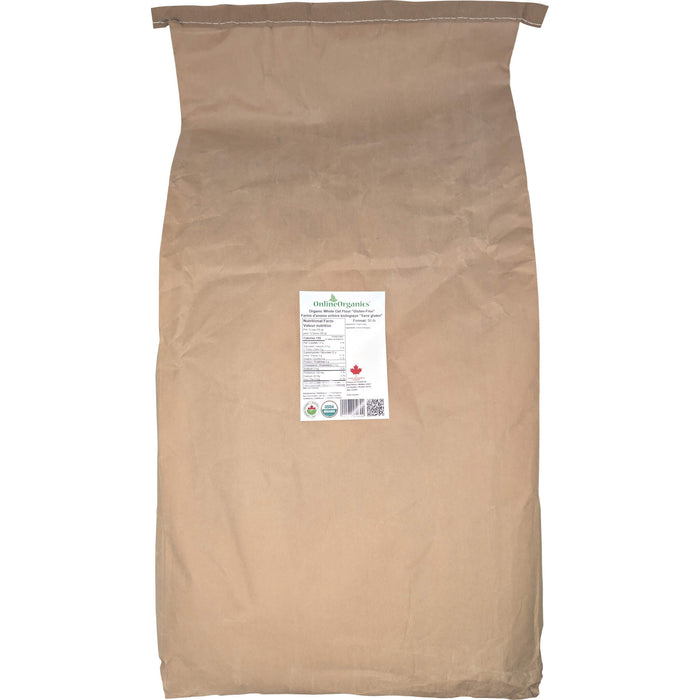

A local product that supports Canadian farmers, artisans and businesses, and reduces the pollution associated with long-distance transport.
Organic Whole Oat Flour "Gluten-Free"
Specifications (Tap to open):
Category:
Shelf Life:
Country of Origin:
Allergen Information (Tap to open):
We take your health and safety very seriously. If you have any allergen inquiries please Contact Us.
If an allergen is present in the product, it will be clearly declared in the ingredients.
"May Contain" statement NEW FOR 2025 (Progressive rollout):
- In 2025 we will be progressively updating our labels and product pictures with our new label that now include a "May Contain" statement.
- The Canadian Food Inspection Agency (CFIA) dictates that "Cross-contamination statements may be declared by food manufacturers and importers".
- That said, we hold ourselves to much higher standards than the CFIA and Health Canada rules oblige. Most companies do not and you will only rarely see "May Contain" statements.
- If there is a remote chance that there might be cross-contamination of a priority allergen, we will declare it on the product label in the form of a "May Contain" statement.
- A "May Contain" statement does not mean that the allergen is present in the product, it is simple a precautionary measure we take to stay the most transparent possible.
- If an allergen is present in the product, it will be clearly declared in the ingredients.
- For example our Quebec made flours come from a mill that makes both oat and wheat flours. Since both allergens are present in the mill we automatically declare the possibility of cross-contamination even if all precautionary measures are taken.
- Only priority allergens are declared in the "May Contain" statement, which are:
- Cereals & Grains: Triticale, Barley, Oats, Rye, Wheat.
- Tree Nuts: Almonds, Brazil Nuts, Cashews, Hazelnuts, Macadamia Nuts, Pecans, Pine Nuts, Pistachios, Walnuts.
- Peanuts
- Sesame
- Eggs
- Milk
- Soy
- Mustard
- Fish
- Seafood: Crustaceans, Molluscs.
- Sulphites
- Priority allergens are decided by government agencies and health boards. To read more on the subject see "Common food allergens - Priority allergens" published by the CFIA.
- Full CFIA cross-contamination statement explanation "Food allergen cross-contamination (or precautionary) statements".






A local product that supports Canadian farmers, artisans and businesses, and reduces the pollution associated with long-distance transport.
Our organic whole oat flour is made from organic oat groats. It is ideal for pastries. For best results, it should be used in combination with wheat flour when making baked goods.
Organic whole oat flour contains potassium, calcium, magnesium, several different B-vitamins and vitamin E. Additionally, oats have trace minerals, such as manganese, copper, iron, selenium and zinc. They are also full of phytochemicals, which are good for you, and contain both insoluble and soluble fiber.
Whole oat flour is made from whole grain oat groats and thus retains the nutrients found in whole grains. Whole grains have the 3 parts of the grain; The bran, endosperm and germ.
Whole grain flour health benefits come mainly from its high-fiber content. High-fiber grains help you with digestion, gut health, and weight management. The FDA even affirms that high-fiber, low-fat diets help reduce the risk of cancer and prevent coronary heart disease.
This organic flour can be used to make: cakes, cookies, muffins, pancakes, pie crusts and waffles.
What is the difference between your regular and gluten-free oat flour?
- To start all Oats are gluten-free. The difference between the regular and gluten-free oat flour is simple the extra level of precautions from cross-contamination. Unless you are extremely intolerant to gluten you will never notice the difference. That is because although oats themselves don't contain gluten, they're often grown alongside other crops. The same equipment is typically used to harvest crops in neighboring fields, which leads a possibility of cross-contamination if one of those crops contains gluten.
General Storage Tips:






